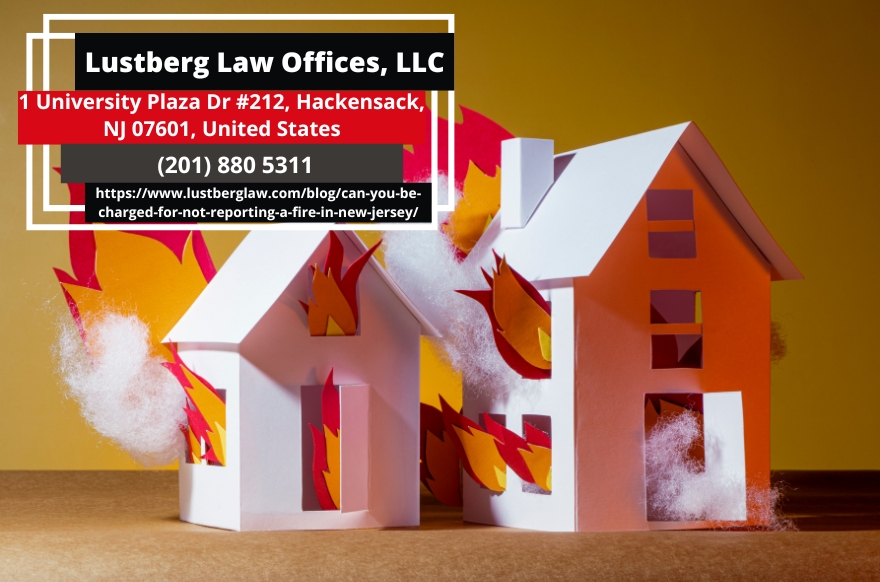New Jersey arson lawyer Adam M. Lustberg (https://www.lustberglaw.com/blog/can-you-be-charged-for-not-reporting-a-fire-in-new-jersey/), founder of Lustberg Law Offices, LLC, is shedding light on an often-overlooked issue in state law: the criminal liability that can result from failing to report a fire. His detailed explanation of the state statute N.J.S.A. 2C:17-1c explores how inaction in certain fire-related situations may lead to a fourth-degree criminal charge.
The issue is especially urgent in a state like New Jersey, where over 25,000 fires were reported in a single year, including more than 1,500 wildfires caused primarily by human activity. In this context, the state’s legal framework holds individuals accountable not only for starting fires but also for failing to respond when lives or property are at risk. According to Adam M. Lustberg, a New Jersey arson lawyer with nearly 20 years of courtroom experience, “New Jersey law has provisions that make not reporting a dangerous fire a criminal offense, and the consequences of a conviction can be life-altering.”
Under N.J.S.A. 2C:17-1c, failing to either control a dangerous fire or notify authorities when it is safe to do so can constitute a fourth-degree crime. This applies in scenarios where a person has knowledge of a fire that threatens life or property and either has a legal duty to act or was involved in the fire’s origin or location. New Jersey arson lawyer Adam M. Lustberg explains that this form of liability is unique in that it penalizes inaction rather than direct conduct. It reflects a targeted legislative approach to situations where silence or delay can result in serious harm.
The statute outlines two specific failures: not taking reasonable steps to control a fire when it is safe to do so, or not promptly reporting it. While it includes a safeguard for those whose intervention would pose a substantial personal risk, the law is otherwise clear: when legal duty or involvement exists, the expectation to act is not optional.
Prosecutors seeking a conviction under this law must meet a three-part test. They must prove that the defendant had actual knowledge of the fire’s danger, failed to act reasonably under the circumstances, and was under a specific legal duty or involved in starting or hosting the fire. Adam M. Lustberg, a seasoned New Jersey arson lawyer, points out that failure to prove any one of these elements is a complete defense. For instance, if someone was unaware of the fire or had no control over the property, criminal liability may not apply.
A conviction for this fourth-degree crime can have lasting consequences. It carries a potential prison sentence of up to 18 months and a fine of up to $10,000. In addition, individuals may be ordered to pay restitution for property damage. Most significantly, the resulting felony record is non-expungeable under New Jersey law. This can limit future access to employment, housing, professional licensing, and civil rights, such as firearm ownership.
The law affects a broad range of individuals, not just those traditionally linked to fire prevention, such as firefighters or building superintendents. It also covers property owners, renters, and even bystanders, depending on their relationship to the fire. Adam M. Lustberg notes that context matters: “The statute includes a critical safety qualifier. It does not require individuals to act if doing so would pose a substantial risk to their own safety.”
Defending against such charges involves examining each of the law’s three components. A defense may focus on whether the person truly knew about the fire, whether it appeared dangerous, and whether action was actually possible without risk. Another strategy may involve demonstrating that the person was not legally responsible for the property or situation in question. The prosecution’s burden is high, requiring proof beyond a reasonable doubt for each element.
Adam M. Lustberg emphasizes the importance of building a defense tailored to the facts of each case. General arguments are rarely enough when facing a charge under N.J.S.A. 2C:17-1c. Legal strategies often challenge the state’s evidence of knowledge, duty, or risk. This might include witness testimony, environmental context, or property records that show who was responsible for the area where the fire occurred.
Failing to report or control a fire in New Jersey is a charge that carries serious legal and practical consequences. The statute may appear narrow in scope, but its impact is wide-ranging. Individuals charged under this law face more than just a court hearing; they face the possibility of a permanent criminal record with no path to expungement.
Those accused of violating this statute should seek guidance early in the process. Adam M. Lustberg and the team at Lustberg Law Offices, LLC, focus on protecting clients from the long-term damage that can result from a conviction under New Jersey’s arson laws. A proactive defense that addresses the statute’s specific requirements is key to minimizing risk and safeguarding future opportunities.
For individuals facing accusations related to failure to report a fire, understanding the law and the seriousness of the charge is the first step toward building a defense. Legal support from an attorney who understands New Jersey’s criminal statutes can make a significant difference in the outcome of a case.
About Lustberg Law Offices, LLC:
Lustberg Law Offices, LLC, founded by Adam M. Lustberg, is a New Jersey-based criminal defense firm with a focus on arson and fire-related cases. Adam M. Lustberg is a Certified Criminal Trial Attorney with nearly two decades of experience in defending clients against serious charges. His work is grounded in a strong legal strategy and a commitment to client rights.
Embeds:
Youtube Video: https://www.youtube.com/watch?v=f3jAsSp-LIo
GMB: https://www.google.com/maps?cid=17248268094099978177
Email and website
Email: alustberg@lustberglaw.com
Website: https://www.lustberglaw.com/
Media Contact
Company Name: Lustberg Law Offices, LLC
Contact Person: Adam M. Lustberg
Email: Send Email
Phone: (201) 880-5311
Address:One University Plaza Dr Suite 212
City: Hackensack
State: New Jersey 07601
Country: United States
Website: https://www.lustberglaw.com/

